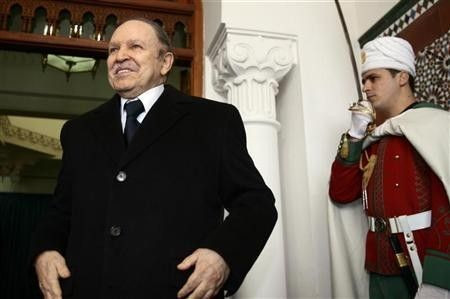France And Algeria: What Can The Upcoming Summit Accomplish?

Algeria's leader said he wants a “strong and dynamic” relationship with his nation’s former colonial ruler, France, ahead of a visit to the North African country by President Francois Hollande.
Algerian President Abdelaziz Bouteflika told Agence France-Presse that his country, which gained independence from France 50 years ago after a bloody civil war, "favors a strong and dynamic relationship with France, based on the depth of links and the many interests which unite our two countries.”
"We hope that the visit of Francois Hollande will mark a new stage in our bilateral relations which are expected to deepen," Bouteflika said.
Bouteflika will meet with his French counterpart on Dec. 19 and 20 in the capital, Algiers.
France, which hosts millions of Algerian immigrants (many of whom are now French nationals), has had a rocky relationship with its former colony, with much bad feeling remaining from the 132-year occupation of Algeria by the French.
Hollande’s predecessor, Nicolas Sarkozy, was unpopular in Algeria due to his pro-American ideologies and his crackdown on immigration in France.
Two months ago, French Foreign Minister Laurent Fabius called for a "strategic partnership" between the two nations.
Bouteflika seemed to concur.
"We must learn from our past experience and actions, and the path of cooperation and partnership can always be improved," he said.
Cherif Rahmani, Algeria’s minister of industry, told Algerian media that the upcoming Hollande-Bouteflika summit will offer “a second wind in our relations.”
"We are at a turning point in relations between the two countries because we are in a world in transition, change and crisis, which calls for the convergence between the two economies and the two policies," he added.
Indeed, AFP noted that Paris and Algiers have enjoyed relatively strong trade relations – France is one of the largest exporters to Algeria, and some 450 French companies operate in the country.
Rahmani said the two nations will likely cooperate on joint ventures spanning the automotive, petrochemicals, pharmaceuticals, construction materials and food industries.
Still, in the 1990s, Italy replaced France as Algeria’s number one trading partner. Algerian exports to France fell from 24 percent of total Algerian trade in 1992 to 16 percent in 2009.
Algeria is also struggling to diversify its economy away from dependence on hydrocarbons and find jobs for its rapidly rising population.
Hollande and Bouteflika are also likely to discuss the turmoil enveloping Algeria's southern neighbor Mali, where an offshoot of al Qaeda has seized control of the north and seeks to establish a Shariah state based on the strictest interpretation of Islamic law.
"Mali enjoys the support of the international community," Bouteflika said, when AFP asked him if Algeria would embrace entreaties from France and the U.S. to fight the jihadists in Mali, perhaps by way of foreign military intervention (although in recent months Bouteflika opposed any such action in Mali).
“Algeria is considered the main power in the region and as such is expected to show a strong interest in resolving the crisis in Mali, even if the Algerian intelligence service is alleged to have played a role in manipulating some terrorist groups currently active in the Sahel,” Laurence Aïda Ammour, a research fellow at the Bordeaux Institute for Political Science and a consultant in international security and defense at Géopoli Sudconsultance, explained to World Politics Review.
“Algeria is keen to stick to a political solution in Mali and wants to play a key mediating role between the actors in the crisis.”
Algeria has long been wary of Western involvement in its backyard, thereby placing Hollande in a precarious predicament.
In addition, Algeria was largely spared the ferment of revolution that swept across the Arab world last year, partly due to reforms Bouteflika established, likely to stave off any civil unrest.
Among other measures, the president, who has ruled Algeria since 1999, permitted the formation of new political parties, the expansion of women’s participation in parliament, as well as promises to revise the constitution.
"This reform process is irreversible because it is unanimously (accepted) by the political class and the civil society," he told AFP.
But Franco-Algerian relations remain extremely difficult.
Ammour explained that relations between France and Algeria have always gone through “cycles of crisis.”
“The weight of the colonial legacy explains why a normalization of relations remains difficult,” he stated.
“Disagreements on geostrategic issues -- including on the Palestinian question, Western Sahara and insecurity in the Sahel -- persist.”
© Copyright IBTimes 2025. All rights reserved.





















